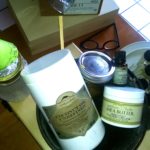We sell honey at Mitchell’s Food Mart in Joliet, IL
Solomon’s Knot has bees because bees do good things for the environment. Solomon’s Knot strives for a mutually beneficial relationship with the bee colonies. The bees’ hives are managed as sustainable as possible using organic methods, but the health of the honeybees is our primary concern. So far, we have used the method of using oxaylic vapor (considered an organic treatment) to manage the varroa mite. The varroa mite is an invasive parasite that is now present in all hives in the U.S. The varroa mite weakens the bees’ immune system, leaving them susceptible to diseases, a cause for colony collapse. If a hive has to be treated because of disease, then the honey and hive byproducts of Solomon’s Knot honeybee agriculture will be specially noted. We make this notification for the benefit of those who may have sensitivities to chemicals. As of Jan. 2024 we have not had to treat the bees for disease.
We sell honey within our bioregion so that the honey’s benefit is realized. Honey should not be fed to infants younger than 12 months of age. “The American Academy of Pediatrics and the World Health Organization advises that honey should not be added to food, water, or formula that is fed to infants younger than 12 months of age. This, technically, applies even to honey in baked or processed food goods.”
Solomon’s Knot views the byproducts of honeybee agriculture as a sweet secondary benefit. We realize that honeybees are essential to agricultural health, that is why we keep hives. We recommend growing native plants if you can, to benefit honeybees and other pollinators.
If your honey sits on a shelf for months, years, decades, or centuries, it is still good to eat as long as the water content was at optimum level at harvest time. If there was too much water then you will have a spoiled form of mead, a fermented drink of the queens of olden days. We always test our honey to make sure that the water content is optimum.
Honey that was harvested at optimum will usually crystallize over time. Sometimes our honey will crystallize within a few months. Crystallization depends on what flowers were in bloom when the bees were gathering nectar and pollen. If this happens then put some water in a pot, after it boils turn off the heat and put the jar of honey in the water for about 20 minutes or so. The honey will clear right up again.
Gini is the extractor, bottling maven. She does not mix honey from the hives together. She spins out the honey from one hive and bottles it separately from another hive. Gini detects subtle differences in color, taste, and consistency in the honey from each hive.
We will recycle our jar if you return it to us. There is a box outside the garage to carefully place the jar in. You have the address. It’s on the label.
Lip Balm is made using aseptic technique in the kitchen of Solomon’s Knot. It is a combination of organic coconut oil, organic shea butter, organic Lavender Spik e essential oil or Orange essential oil, and Solomon’s Bees’ wax. The Lavender is the calm in the balm and orange you glad there is some calm? Some are made without essential oils. All products are tested by friends. They like them.
e essential oil or Orange essential oil, and Solomon’s Bees’ wax. The Lavender is the calm in the balm and orange you glad there is some calm? Some are made without essential oils. All products are tested by friends. They like them.
If you put the lip balm jar on a shelf and haven’t used it for a few months (or years) it will still be good to use, but you may notice a white “bloom”. This is only crystallized fat. You can heat it uncapped in the microwave for a very few seconds. The bloom will disappear for a little bit.
Bees wax is melted and filtered. It is a yellow color. Gini experimented with sun bleaching the wax to make it a lighter color. It didn’t really make that much of a difference. Like the honey, wax is not mixed, so it’s naturally different shades of color from bright yellow to brown. There is some off-white wax too, but not much. Contact us if you want bees wax.
Solomon’s Knot is a member of the Community Collaborative Rain Hail & Snow Network (CoCoRaHS). You can follow IL-WL-103. at this link
